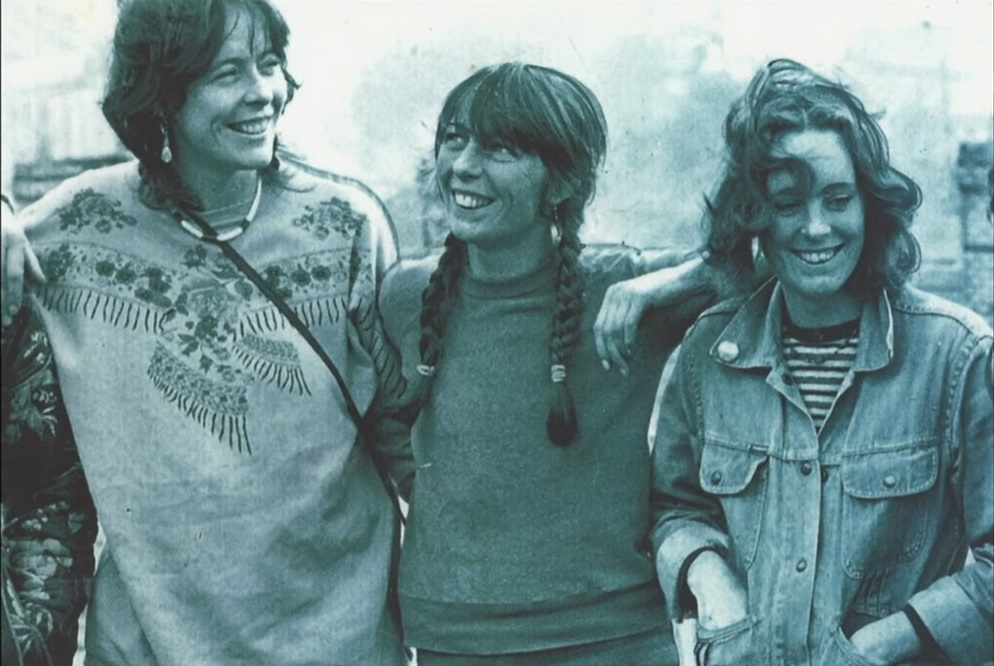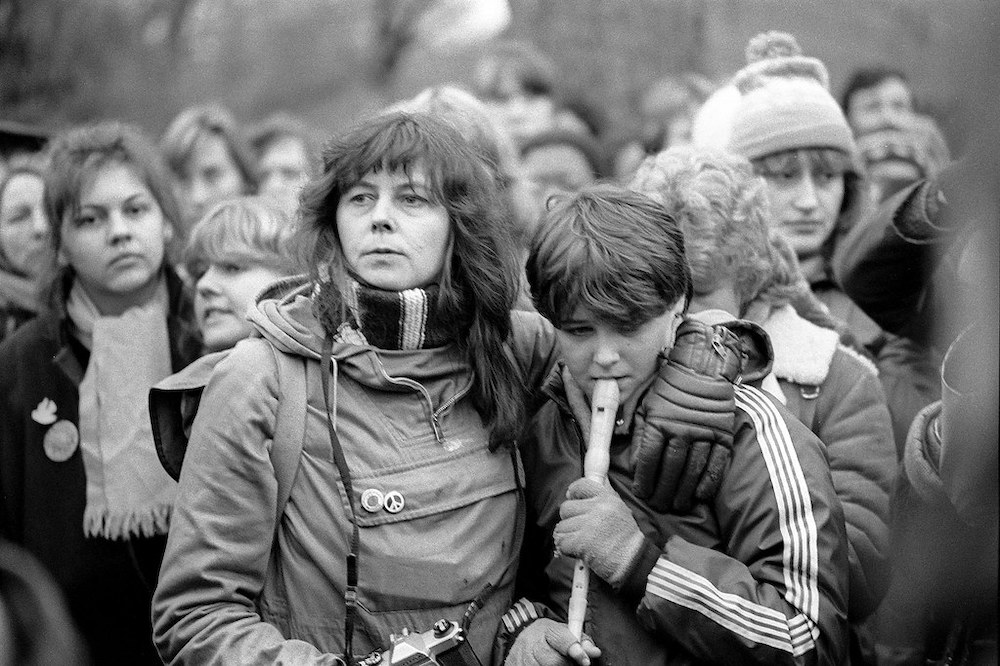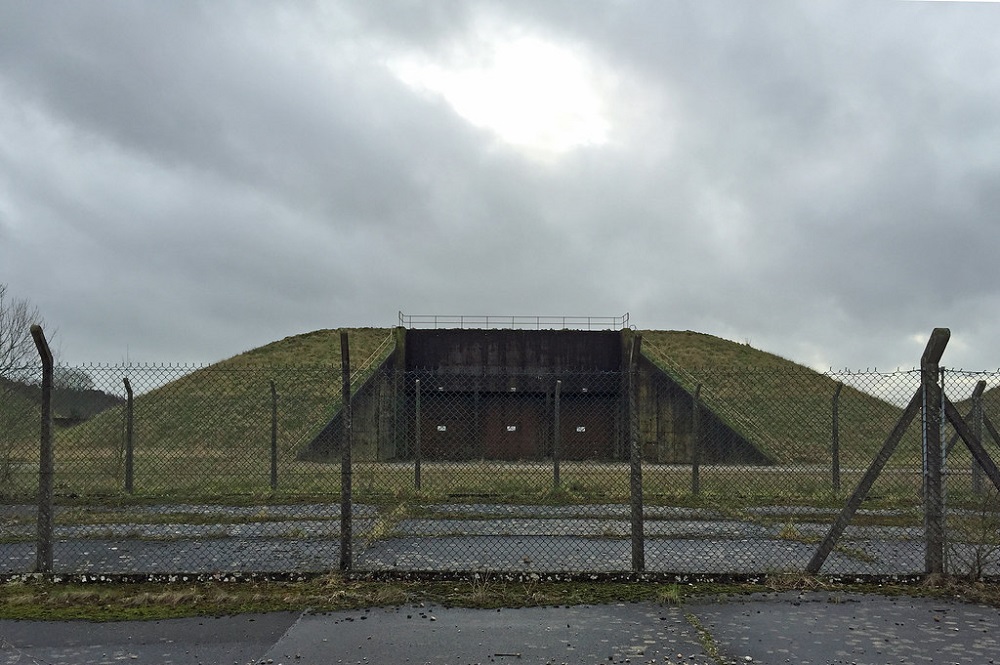Review: Mothers, Missiles & the American President

Sarah Morgan Jones
Forty years ago, while the world was listening to Bonnie Tyler and suffering from Royal Wedding fever, four women from Porth in the Rhondda Valley were trying to work out why the press was letting them down.
A powerful and moving documentary, marking forty years since the revolutionary Greenham Common protests, looks back on the events that led these ordinary women – “just housewives, for heaven’s sake” – to risk their home lives and liberties for the very future of their children and the generations to come.
Sue, Christine and Lesley Brinkworth, three sisters from a large Welsh Baptist family, and their friend Kathy Edwards, were busy settling into the life expected of Valleys women at the time: marrying, having babies and giving up work to become housewives.
The Brinkworths watched, as, down the road in Cardiff, a bunch of women and children began a 120-mile walk. Their destination was Greenham Common, a military base in Berkshire, where US president Ronald Reagan planned to site his nuclear warheads, perfectly placed to reach Soviet soil in the event of an attack.
The walking women intended to turn up and protest, raise some awareness, initiate some debate. But nobody took any notice. So, they set up camp.
This media silence triggered a deep rage in the Rhondda women. With small children of their own, they couldn’t believe that no one was interested. That their fellow women had walked so far to take on ‘Goliath’ and were not considered newsworthy turned their feelings of impotence into action, and they set up a camp of their own in Porth town square. Like their sisters in Berkshire, they wanted to raise awareness, they wanted debate, they wanted to be heard.
So began a series of events that would change their lives, destroy marriages, and turn them into women with criminal records.
Protect & survive
The world outside the small Valleys town of Porth, halfway between Tonypandy and Pontypridd, was beginning to march to the self-made, self-centred beat of Thatcherism while the heart of industrial Wales was being dismantled mine by mine by mine.
The sense of every man for himself, drummed into the British psyche at the time, was being fed by fears of war, jingoism and burgeoning capitalism. The cold war was heating up. Thatcher was developing a special relationship with Reagan. Brezhnev was wielding the big guns, supressing his own people, invading and crushing enemy states, and threatening to destroy the world with the nuclear button.

Every household in the land was sent the ludicrous “Protect & Survive” leaflets. They gathered round the TV to watch the propaganda film, which suggested that four doors and some sofa cushions would save the nuclear family from the worst elements of an atomic bomb. The national fear was palpable, and no one believed for a minute that this would keep them safe.
Only 35 years earlier, the devastating attacks on Hiroshima and Nagasaki had stopped the war in its tracks. Well within living memory, the horrors were still imprinted in the minds of people, and part of the generational collective memory.
Now & then
We look back on the eighties as if the decade was just around the corner. Forty years on and in a different century, the world we now live in is unrecognisable by comparison.
Now, a protest can be organised and co-ordinated within a matter of hours, thanks to social media and technology. Back then, the press and the broadcast media were the only sources of disseminating news.
Now, someone interested in a subject can become well versed, if not ‘expert’, within a matter of days. Back then, it was through meetings, conversations and heated debate stemming from news stories, that ordinary people became informed, knowledgeable, and opinionated.
Now, people do not debate so much face to face, but rather engage in anonymised online debate, attack, and cancellation, backing themselves up with articles and facts and their fingertips. Back then, those women, who set up camp in Porth town square for a week, had to stand alongside and in front of their fellow townsfolk and put their point across, share what they knew, persuade, and call for solidarity and action.

This took such courage, such determination and bravery. Some agreed with them, supported them. Local builders dropped off a little hut for them. One man arrived late at night in the square and said, “My wife wouldn’t let me sleep until I came down and made sure you were all ok.”
When they went on to join the camp at Greenham, many stood against them. They experienced, sometimes with brutal violence, the resistance to their cause from local people, police, armed forces, and bailiffs.
On the news, commentator Auberon Waugh described them as “Hard voiced, slit eyed, jargon spouting freaks…who sought to escape sex…”.
Celebration
These women, and so many others at Greenham, put their busy lives on hold, chose their belief in the greater good over the possibly easier route of keeping their heads down and carrying on in blissful ignorance.
This documentary brings these remarkable women, who could not keep their heads down, back together to reflect on what it was like at the time. They talk candidly and exceptionally movingly about their experiences, hope and disappointments, on their losses, and what they they achieved. Their friends, families, and their lawyer, add personal perspectives to the tale, along with the perfectly framed cultural and political contexts.
It is a beautiful and timely celebration of their strength and selflessness, and of the importance in speaking up for and standing by your principles.
As one protester told Sue when she expressed her feelings of powerlessness and terror for the children of the world, “You are not ‘just’ housewives! You are mothers! You are home makers! You are carers!” She reflects on what a powerful statement this was for her.
Looking back, she says “You can change big things and you can change small things…You can set goals and get organised. You can change the world.”
Mothers, Missiles & the American President is on BBC1 Wales, 9pm, 25th August 2021
Support our Nation today
For the price of a cup of coffee a month you can help us create an independent, not-for-profit, national news service for the people of Wales, by the people of Wales.







Excellent documentary – well worth catching on iPlayer if you missed it.